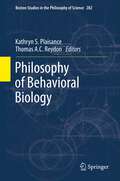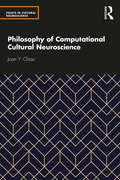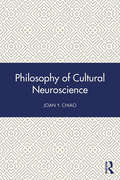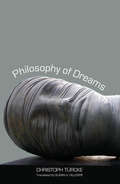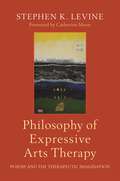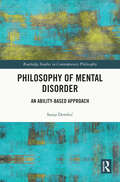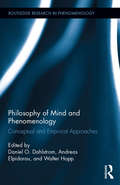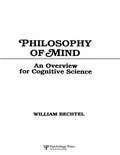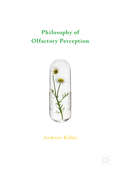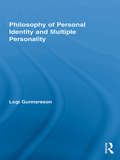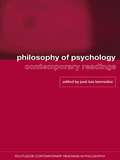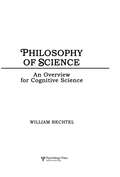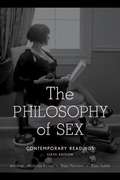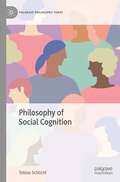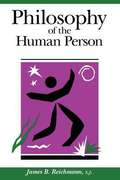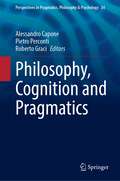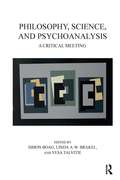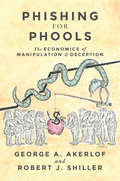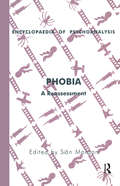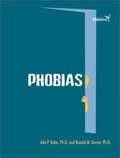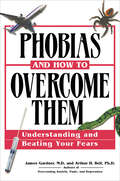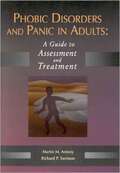- Table View
- List View
Philosophy and Theory of Artificial Intelligence 2017 (Studies in Applied Philosophy, Epistemology and Rational Ethics #44)
by Vincent C. MüllerThis book reports on the results of the third edition of the premier conference in the field of philosophy of artificial intelligence, PT-AI 2017, held on November 4 - 5, 2017 at the University of Leeds, UK. It covers: advanced knowledge on key AI concepts, including complexity, computation, creativity, embodiment, representation and superintelligence; cutting-edge ethical issues, such as the AI impact on human dignity and society, responsibilities and rights of machines, as well as AI threats to humanity and AI safety; and cutting-edge developments in techniques to achieve AI, including machine learning, neural networks, dynamical systems. The book also discusses important applications of AI, including big data analytics, expert systems, cognitive architectures, and robotics. It offers a timely, yet very comprehensive snapshot of what is going on in the field of AI, especially at the interfaces between philosophy, cognitive science, ethics and computing.
Philosophy in Turbulent Times: Canguilhem, Sartre, Foucault, Althusser, Deleuze, Derrida
by Elisabeth RoudinescoFor Elisabeth Roudinesco, a historian of psychoanalysis and one of France's leading intellectuals, Canguilhem, Sartre, Foucault, Althusser, Deleuze, and Derrida represent a "great generation" of French philosophers who accomplished remarkable work and lived incredible lives. These troubled and innovative thinkers endured World War II and the cultural and political revolution of the 1960s, and their cultural horizon was dominated by Marxism and psychoanalysis, though they were by no means strict adherents to the doctrines of Marx and Freud. Roudinesco knew many of these intellectuals personally, and she weaves an account of their thought through lived experience and reminiscences. Canguilhem, for example, was a distinguished philosopher of science who had a great influence on Foucault's exploration of sanity and madness-themes Althusser lived in a notorious personal drama. And in dramatizing the life of Freud for the screen, Sartre fundamentally altered his own philosophical approach to psychoanalysis. Roudinesco launches a passionate defense of Canguilhem, Sartre, Foucault, Althusser, Deleuze, and Derrida against the "new philosophers" of the late 1970s and 1980s, who denounced the work-and sometimes the private lives-of this great generation. Roudinesco refutes attempts to tar them, as well as the Marxist and left-wing tradition in general, with the brush of Soviet-style communism. In Freudian theory and the philosophy of radical commitment, she sees a bulwark against the kind of manipulative, pill-prescribing, and normalizing psychology that aims to turn individuals into mindless consumers. Intense, clever, and persuasive, Philosophy in Turbulent Times captivates with the dynamism of French thought in the twentieth century.
Philosophy of Behavioral Biology
by Thomas A.C. Reydon Kathryn S. PlaisanceThis volume provides a broad overview of issues in the philosophy of behavioral biology, covering four main themes: genetic, developmental, evolutionary, and neurobiological explanations of behavior. It is both interdisciplinary and empirically informed in its approach, addressing philosophical issues that arise from recent scientific findings in biological research on human and non-human animal behavior. Accordingly, it includes papers by professional philosophers and philosophers of science, as well as practicing scientists. Much of the work in this volume builds on presentations given at the international conference, "Biological Explanations of Behavior: Philosophical Perspectives", held in 2008 at the Leibniz Universität Hannover in Germany. The volume is intended to be of interest to a broad range of audiences, which includes philosophers (e.g., philosophers of mind, philosophers of biology, and metaethicists), as well as practicing scientists, such as biologists or psychologists whose interests relate to biological explanations of behavior.
Philosophy of Computational Cultural Neuroscience (Essays in Cultural Neuroscience)
by Joan Y ChiaoThis book aims to illuminate theoretical and methodological advances in computational cultural neuroscience and the implications of these advances for philosophy. Philosophical studies in computational cultural neuroscience introduce core considerations such as culture and computation, and the role of scientific and technological progression for the advancement of cultural processes. The study of how cultural and biological factors shape human behaviour has been an important inquiry for centuries, and recent advances in the field of computational cultural neuroscience allow for novel insights into the computational foundations of cultural processes in the structural and functional organization of the nervous system. The author examines the computational foundations of the mind and brain across cultures and investigates the influence of culture on the computational mind and brain. The book explores recent advances in the field, providing novel insights on topics such as artificialism, reconstructionism, and intelligence. Philosophy of Computational Cultural Neuroscience is fascinating reading for students and academics in the field of neuroscience who wish to take a cultural or philosophical approach to their studies and research.
Philosophy of Cultural Neuroscience
by Joan Y. ChiaoThe goal of this volume is to highlight theoretical and methodological advances in cultural neuroscience and the implications of theoretical and empirical advances in cultural neuroscience for philosophy. The study of cultural and biological factors that contribute to human behavior has been an important inquiry for centuries, and recent advances in the field of cultural neuroscience allow for novel insights into how cultural and biological factors shape mind, brain and behavior. Theoretical and empirical advances in cultural neuroscience, which investigate the origins of culture, may shed light on philosophical issues of the mind and science.
Philosophy of Dreams
by Susan H. Gillespie Christoph TurckeWhy has humankind developed so differently from other animals? How and why did language, culture, religion, and the arts come into being? In this wide-ranging and ambitious essay, Christoph Türcke offers a new answer to these timeworn questions by scrutinizing the phenomenon of the dream, using it as a psychic fossil connecting us with our Stone Age ancestors. Provocatively, he argues that both civilization and mental processes are the results of a compulsion to repeat early traumas, one to which hallucination, imagination, mind, spirit, and God all developed in response. Until the beginning of the modern era, repetition was synonymous with de-escalation and calming down. Then, automatic machinery gave rise to a new type of repetition, whose effects are permanent alarm and distraction. The new global forces of distraction, Türcke argues, are producing a specific kind of stress that breaks down the barriers between dreams and waking consciousness. Türcke’s essay ends with a sobering indictment of this psychic deregulation and the social and economic deregulations that have accompanied it.
Philosophy of Expressive Arts Therapy: Poiesis and the Therapeutic Imagination
by Stephen K. LevineLaying the philosophical foundations of expressive arts therapy, this book highlights the role and importance of poiesis, the art of 'making' as a response to the world, in the expressive arts therapies as well as our own lives. The concept of poiesis was originally developed and brought into the field by Stephen K. Levine. It is a perspective that restores the primacy of the arts for the arts therapies instead of reducing art-making and art-objects to psychological data. Bringing together different schools of thought in unexpected ways, this book shows how the principles underlying expressive arts therapy have relevance to ethics, politics and social change. It includes chapters on Taoism, improvisation in the arts, and the importance of creativity for understanding human existence. With personal narratives and poetry to help create natural points for the reader to stop and reflect, Philosophy of Expressive Arts Therapy is the perfect guide for those wanting to understand the role of the arts and art-making in life and in therapeutic change.
Philosophy of Mental Disorder: An Ability-Based Approach (Routledge Studies in Contemporary Philosophy)
by Sanja DembićThis book offers an ability-based view of mental disorders. It develops a detailed analysis of the concept of inability that is relevant in the psychiatric and psychotherapeutic context by drawing on the most recent literature on the concepts of ability, reasons, and harm. What is it to have a mental disorder? This book contends that an individual has a mental disorder if and only if (1) they are・in the relevant sense・unable to respond adequately to their available (apparent) reasons in their thinking, feeling, or acting, and (2) they are harmed by the condition underlying or resulting from that inability. The author calls this the “Rehability View.” This view can account for what is “mental” about mental disorders: it is the rational relations among an individual’s attitudes and actions that are “disordered,” and the relevant norms are the norms of reasons. This view is compatible with explanations of mental disorders in terms of biological dysfunctions, without reducing the former to the latter. The aim is not to offer just another conception of mental disorder, but to develop a systematic approach that incorporates insights from the philosophy of psychiatry and adjacent philosophical disciplines. Philosophy of Mental Disorder will be of interest to scholars and advanced students working in philosophy of psychiatry, philosophy of mind, philosophy of action, ethics, and mental health.
Philosophy of Mind and Phenomenology: Conceptual and Empirical Approaches (Routledge Research in Phenomenology)
by Daniel O. Dahlstrom Walter Hopp Andreas ElpidorouThis volume identifies and develops how philosophy of mind and phenomenology interact in both conceptual and empirically-informed ways. The objective is to demonstrate that phenomenology, as the first-personal study of the contents and structures of our mentality, can provide us with insights into the understanding of the mind and can complement strictly analytical or empirically informed approaches to the study of the mind. Insofar as phenomenology, as the study or science of phenomena, allows the mind to appear, this collection shows how the mind can reappear through a constructive dialogue between different ways—phenomenological, analytical, and empirical—of understanding mentality.
Philosophy of Mind: An Overview for Cognitive Science (Tutorial Essays in Cognitive Science Series)
by William BechtelSpecifically designed to make the philosophy of mind intelligible to those not trained in philosophy, this book provides a concise overview for students and researchers in the cognitive sciences. Emphasizing the relevance of philosophical work to investigations in other cognitive sciences, this unique text examines such issues as the meaning of language, the mind-body problem, the functionalist theories of cognition, and intentionality. As he explores the philosophical issues, Bechtel draws connections between philosophical views and theoretical and experimental work in such disciplines as cognitive psychology, artificial intelligence, linguistics, neuroscience, and anthropology.
Philosophy of Olfactory Perception
by Andreas KellerThis book reconsiders the majorcurrent topics in the philosophy of perception using olfaction as the paradigmsense. The author reveals how many of the most basic concepts of philosophy ofperception are based on peculiarities of visual perception not found in othermodalities, and addresses how different the philosophy of perception would beif based on olfaction. The book addresses several aspects of olfaction,including perceptual qualities, percepts, olfaction and cognitive processes,and consciousness. The first partof the book considers perception with respect to its ability to guide behaviorsand to make information available to cognitive processes. The author continuesby addressing the differences between conscious and non-conscious olfactoryperception, and presents an argument for an important role of attention inconscious processes. The book concludes by discussing the function of consciousbrain processes and their link to guiding behaviors in complex situations.
Philosophy of Personal Identity and Multiple Personality (Routledge Studies in Contemporary Philosophy)
by Logi GunnarssonAs witnessed by recent films such as Fight Club and Identity, our culture is obsessed with multiple personality—a phenomenon raising intriguing questions about personal identity. This study offers both a full-fledged philosophical theory of personal identity and a systematic account of multiple personality. Gunnarsson combines the methods of analytic philosophy with close hermeneutic and phenomenological readings of cases from different fields, focusing on psychiatric and psychological treatises, self-help books, biographies, and fiction. He develops an original account of personal identity (the authorial correlate theory) and offers a provocative interpretation of multiple personality: in brief, "multiples" are right about the metaphysics but wrong about the facts.
Philosophy of Psychology: Contemporary Readings (Routledge Contemporary Readings in Philosophy)
by Jose Luis BermudezPhilosophy of Psychology: Contemporary Readings is a comprehensive anthology that includes classic and contemporary readings from leading philosophers. Addressing in depth the major topics within philosophy of psychology, the editor has carefully selected articles under the following headings: pictures of the mind commonsense psychology representation and cognitive architecture. Articles by the following philosophers are included: Blackburn, Churchland, Clark, Cummins, Dennett, Davidson, Fodor, Kitcher, Lewis, Lycan, McDowell, McLeod, Rey, Segal, Stich. Each section includes a helpful introduction by the editor which aims to guide the student gently into the topic. The book is highly accessible and provides a broad-ranging exploration of the subject, including discussion of the leading philosophers in the field. Ideal for any student of philosophy of psychology or philosophy of mind.
Philosophy of Science: An Overview for Cognitive Science (Tutorial Essays in Cognitive Science Series)
by William BechtelThis text focuses on two major issues: the nature of scientific inquiry and the relations between scientific disciplines. Designed to introduce the basic issues and concepts in the philosophy of science, Bechtel writes for an audience with little or no philosophical background. The first part of the book explores the legacy of Logical Positivism and the subsequent post-Positivistic developments in the philosophy of science. The second section examines arguments for and against using a model of theory reduction to integrate scientific disciplines. The book concludes with a chapter describing non-reductionist approaches for relating scientific disciplines using psycholinguistic and cognitive neuroscience models.
Philosophy of Sex
by Alan Soble Raja Halwani Nicholas PowerFeaturing twenty-nine essays, thirteen of which are new to this edition, this best-selling volume examines the nature, morality, and social meanings of contemporary sexual phenomena. Topics include sexual desire, masturbation, sex on the Internet, homosexuality, transgender and transsexual issues, marriage, consent, exploitation, objectification, rape, pornography, promiscuity, and prostitution.
Philosophy of Social Cognition (Palgrave Philosophy Today)
by Tobias SchlichtThis introductory textbook provides a comprehensive and up-to-date overview of the main issues in contemporary philosophy of social cognition. It explains and critically discusses each of the key philosophical answers to the captivating question of how we understand the mental life of other sentient creatures. Key Features:· Clearly and fully describes the major theoretical approaches to the understanding of other people’s minds.· Suggests the major advantages and limitations of each approach, indicating how they differ as well as the ideas they have in common. · Tests each philosophical theory against the best available empirical data from psychology, neuroscience and psychopathology.· Includes suggestions for additional reading and practice study questions at the end of each chapter. Philosophy of Social Cognition is essential reading for all undergraduate and graduate students taking introductory courses on social cognition. It is also ideal for courses on cognitive neuroscience, social psychology and sociological theory.
Philosophy of the Human Person
by James B. ReichmannThis book provides the student of philosophy with a comprehensive discussion of the human experience, with the single aim of uncovering the meaning of being human.
Philosophy's Moods: The Affective Grounds of Thinking
by Ilit Ferber Hagi KenaanPhilosophy's Moods is a collection of original essays interrogating the inseparable bond between mood and philosophical thinking. What is the relationship between mood and thinking in philosophy? In what sense are we always already philosophizing from within a mood? What kinds of mood are central for shaping the space of philosophy? What is the philosophical imprint of Aristotle's wonder, Kant's melancholy, Kierkegaard's anxiety or Nietzsche's shamelessness? Philosophy's Moods invites its readers to explore the above questions through diverse methodological perspectives. The collection includes twenty-one contributions by internationally renowned scholars as well as younger and emerging voices. In pondering the place of the subjective and personal roots that thinking is typically called to overcome, the book challenges and articulates an alternative to a predominant tendency in philosophy to view the theoretical content and the affective side of thought as opposed to one another.
Philosophy, Cognition and Pragmatics (Perspectives in Pragmatics, Philosophy & Psychology #34)
by Alessandro Capone Pietro Perconti Roberto GraciThis book contains essential contributions to enrich and broaden the application field of pragmatics. It provides an example of how the fruitful reflections and refined conceptual distinctions born in the philosophical field can find a practical application in addressing social, cognitive, clinical, and psychological problems. Its chapters address, from different points of view, the relationship between pragmatic linguistics and philosophy, and outline the possible application of pragmatic theories to different domains. Developed during the third Pragmasophia international conference, whose name is derived from the Greek terms πρᾶγμα (action, fact) and σοϕία (knowledge, science), the book aligns itself with its aim to study human actions and activities and how they take shape through language. But ‘Pragma’ and ‘Sophia’ also signal another purpose: highlighting the importance of creating links between empirical investigations on language use, and more traditional philosophical approaches. In this reading, ‘Pragma’ represents the experimental goal devoted to analysing and interpreting language facts. In contrast, the term ‘Sophia’ recalls the original vocation of past philosophers to pursue an ideal of ‘pure knowledge’, disconnected from any practical-economic interest. While maintaining the conference's original purpose of encouraging productive comparisons between different approaches, the book consists of two sections: first, on philosophical approaches, recalls more theoretical aspects (closer to the term ‘Sophia’); the second, ‘Inferential and Cognitive Pragmatics,’ addresses more practical issues affecting domains such as Greek literature, pragmatic disorders, dictionary entries, and speech analysis. The reader, whether in linguists, philosophy or psychology, obtains a complete overview of the most advanced current research lines, both theoretical and empirical, and thus contributes to broadening the scope of pragmatics.
Philosophy, Science, and Psychoanalysis: A Critical Meeting
by Simon BoagThe perennial interest in psychoanalysis shows no signs of abating and the longevity of psychoanalytic theory is seen in the varied extensions and elaborations of Freudian thinking in the fields of neuroscience and cognitive theory. Nevertheless, the scientific standing of psychoanalysis has long been questioned and developments in the fields of the philosophy of science and psychology require a fresh assessment of the scientific standing of psychoanalysis. While there are a range of views on the topic of whether psychoanalysis is in fact scientific, any satisfactory approach to understanding mind and behaviour requires an approach that is at once both philosophic and scientific. Accordingly, to even approach the question regarding the scientific nature of psychoanalysis, a foundation comprising a sophisticated conceptual and philosophical framework is required. This volume represents the junction where philosophy, science, and psychoanalysis meet and presents arguments critical and supportive of the scientific standing of psychoanalysis.
Phishing for Phools
by Robert J. Shiller George A. AkerlofEver since Adam Smith, the central teaching of economics has been that free markets provide us with material well-being, as if by an invisible hand. In Phishing for Phools, Nobel Prize-winning economists George Akerlof and Robert Shiller deliver a fundamental challenge to this insight, arguing that markets harm as well as help us. As long as there is profit to be made, sellers will systematically exploit our psychological weaknesses and our ignorance through manipulation and deception. Rather than being essentially benign and always creating the greater good, markets are inherently filled with tricks and traps and will "phish" us as "phools."Phishing for Phools therefore strikes a radically new direction in economics, based on the intuitive idea that markets both give and take away. Akerlof and Shiller bring this idea to life through dozens of stories that show how phishing affects everyone, in almost every walk of life. We spend our money up to the limit, and then worry about how to pay the next month's bills. The financial system soars, then crashes. We are attracted, more than we know, by advertising. Our political system is distorted by money. We pay too much for gym memberships, cars, houses, and credit cards. Drug companies ingeniously market pharmaceuticals that do us little good, and sometimes are downright dangerous.Phishing for Phools explores the central role of manipulation and deception in fascinating detail in each of these areas and many more. It thereby explains a paradox: why, at a time when we are better off than ever before in history, all too many of us are leading lives of quiet desperation. At the same time, the book tells stories of individuals who have stood against economic trickery--and how it can be reduced through greater knowledge, reform, and regulation.
Phobia: A Reassessment (The Encyclopaedia of Psychoanalysis)
by Sian MorganThis volume in the seminal Encyclopaedia of Psychoanalysis Series is a daring reassessment of the psychoanalytic theory of phobia from numerous schools of thought. This book should illuminate why psychoanalysis has been under-used in the treatment of phobia - is it simply that other treatments are more successful or is it a symptom of today's "quick fix" culture? By considering the origins and meanings of phobia from such a wide range of viewpoints, it may be possible to formulate new approaches to the therapeutic treatment of phobia and re-engage the interests of the psychoanalytic community in this fascinating subject. 'In recent years research, theorization, and the treatment of phobias have been dominated by biological and psychopharmacological approaches, and by cognitive-behavioural therapies. Writings on phobia have diminished in the field of psychoanalysis. This book is an attempt to redress the balance and focuses not on treatment but on the origin and meaning of phobia. This collection, then, concentrates on the personal, mythological and cultural meanings of phobia and its origins' - The author from her Introduction.
Phobias
by Ada P. Kahn Ronald M. DoctorEveryone is afraid of something. Some fears are inherited, such as being separated from our parents. Others, such as being afraid of dogs, happen as a result of our own unique life experiences. Phobias helps put our fears into perspective, from identifying common fears to understanding unrealistic ones. It also includes a test you can take to learn more about your own responses to fearful situations. Find out how you can overcome your fears with the help of a few simple techniques.
Phobias and How to Overcome Them: Understanding and Beating Your Fears
by Arthur H. Bell James GardnerA handbook for sufferers, those who treat them, and those who love them.What distinguishes a fear from a phobia? How do I know if I have one? What treatments for phobias have proven most effective? These and many other questions are addressed in this guide to the complex issue of phobias—which come in many forms and many degrees of severity. Based on scientific and clinical research as well as patients’ experiences, Phobias and How to Overcome Them delves into topics including:*Recognizing the symptoms of phobias*Stories of successful treatments*Specific phobias both common and uncommon*Medical evaluation and treatment of phobias*The roles of counseling, psychotherapy, and cognitive-behavioral therap*Other anxiety disorders and mood disorders that may underlie phobias*Resources for additional helpIn addition, Dr. Gardner provides an Anxiety Toolkit that can be used to combat and conquer phobias—offering new techniques and new hope for people who experience these debilitating fears that can not only affect physical health but also interfere with full and joyful participation in life.
Phobic Disorders and Panic in Adults: A Guide to Assessment and Treatment
by Martin M. Antony Richard P. SwinsonIn recent years, enormous advances have been made in the understanding and treatment of phobic disorders. This volume provides extensive information on the three main types of phobic disorders- panic disorder and agoraphobia, social phobia and specific disorder. Throughout, current research findings are integrated with recommendations for diagnosis and treatment.For each of these disorders, clinicians will find guidelines for assessment, including diagnostic interviews, behavioural assessments, symptom diaries, and standardized self reports. The authors present flexible and detailed treatment protocols for each disorder that include session frequency and duration, sequencing of cognitive and behavioral strategies, bibliotherapy, homework, and monitoring forms for tracking patient progress. Basic principles of exposure-based treatment and social skills training and the most effective cognitive techniques are described, illuminated by sample therapist-patient dialogue and troubleshooting tips. Information on commonly ued medications is also included.


